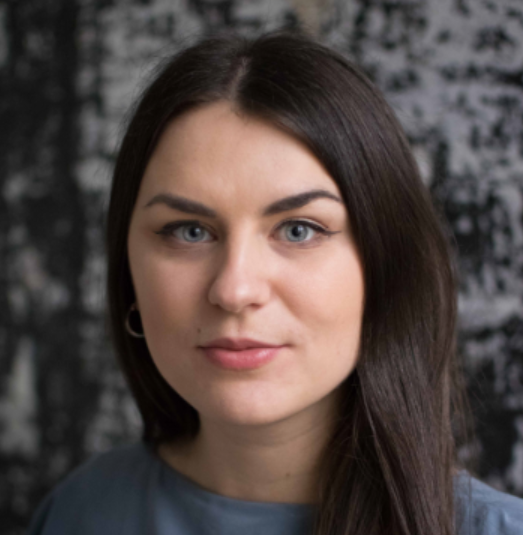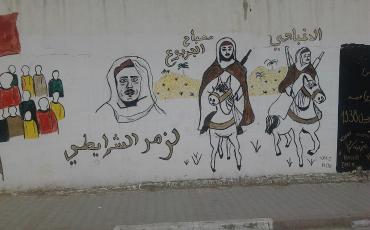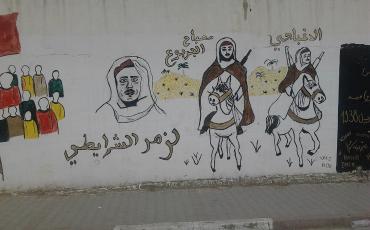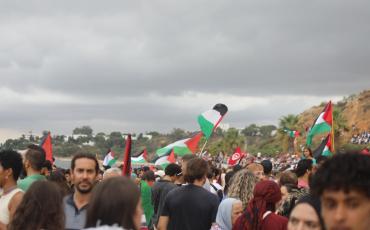Chouf is a Tunisian NGO that advocates for women’s physical and sexual rights. In 2015, the organization launched the annual international feminist art festival Chouftouhonna in Tunis to promote awareness and visibility of intersectional feminist struggles. In an interview with the Rosa-Luxemburg-Stiftung and Alsharq, feminist Chouf activist Bochra Triki talked about the importance of inclusiveness, pushing boundaries, and current challenges for feminist and queer activism in Tunisia. By Anna-Theresa Bachmann
Bochra Triki: If you look at the other countries that had revolts or revolutions, Tunisia is way better off. But this does not mean that everything is fine. We have a lot of problems with access to justice and corruption of justice. For me, this is essential because without real justice, there is no reform. Last year, the new law combating violence against women was passed which is great. It touches upon many important points such as martial rape which previously was not criminalized. So far, it is only on paper. Because there is no campaigning, women are not aware of these laws.
Even if the media tells us that Tunisia is heading in the right direction, we are still struggling with the same problems. The only difference is that now we can talk about it publicly. Our civil society is more organized now, so we can put more pressure on the government and hold them accountable for their actions.
The first two editions were held in Carthage because Raja Ben Ammar, the director of the Mad’art theatre, was a famous artists and feminist [who died in 2017, editor’s note] and we wanted to create a safe space in a supportive environment. But Carthage is a quite bourgeois and rich neighbourhood. For the third edition, we wanted to be closer to downtown to be more accessible for everyone. It is easy to put on a feminist festival in a fancy neighbourhood, but it also brings back the stereotype that feminism is an elitist movement. Also, we needed more space.
Halfaouine is one of the oldest neighbourhoods in Tunis. It is very closed and male-dominated, but also home to the National Theatre. Since we moved there, the festival not only gained more visibility but is also more respected than before, also by the media. They came to understand that the festival addresses many other issues such as the economy or agriculture from a feminist point of view.
It is our choice not to limit entry to people who think like us. Otherwise we will not change anything. We instead try to create connections between two circles, which usually do not communicate. When we first knocked on Ben Ammar’s door she said that she had one condition: no self-censorship. We agreed, but that is actually quite difficult. This year we received 500 applications. While some of the pieces and performances would be seen as totally normal in Berlin, they can be very provocative in our context—for example if they include a lot of nudity or sex. We then ask ourselves: is it worth it?
Last year, we had a very interesting piece by an Italian performer who is a drag queen but also drag king. She ends the performance half-naked, wearing a sex toy. We told her beforehand that if is not necessary to end her performance like this, we would prefer if she did not do it. She said she understood. The day of the performance, I was outside but people from the organizing team started texting everyone: she’s half-naked now! – Ok, nothing happened. She is with a sex toy! We were following it like a ticking time bomb. By the end of the performance a family from the neighbourhood came outside, which brought all the Islamist images to your mind: a man with a long beard and wearing djellaba and a veiled woman with a 12-year-old child.
They were walking towards me and I was waiting for their insults. I was prepared for everything apart from their actual reaction: “We did not know anything about drag. Yesterday we saw a movie about a drag queen here, today we saw a performance. Thank you for letting us know that drag exists”, they said. These are little things that make us proud because, for us, the festival is a way to also break a lot of stereotypes regarding feminism and queerness. But it also breaks many of our own stereotypes. We are also invading locals’ comfort zone – a bunch of women laughing in the men’s cafe. For us, it should then be OK if they invade ours, too.
The festival became a meeting place for feminists who come from very different contexts, which itself is something very powerful. It creates an opportunity for North African and West Asian artists to explain their struggles to artists from Europe or the US who have distant points of view or maybe even false ideas about our region. This time for example, we had a panel about feminists from North Africa who now live in Europe and who try to create feminist practices in a non-occidental way. One of the German artists was amazed. For us, this shows that what we are doing works.
One of the important projects we did this year was a movie tour through male prisons, dorms of young women and women’s shelters. The movie in based on a true story of a woman who was raped by two policemen in 2013. They sued her for immorality, but she also sued them for rape. The trial was very long and closely followed by civil society. At the end, the two policemen were sentenced to seven years in prison, but the women objected by referring to the law which stipulates longer than that. She renewed the trail and it became 15 years.
Tunisian movie director Kaouther Ben Henia turned the story into a movie titled “Beauty and the Dogs” that we screened in cooperation with Echos Cinématographiques. Their main goal is to show movies in places which do not really have access to culture. They got access to the prisons, and we moderated the screenings. It was a very powerful experience to show it in a male prison because it started a discussion about sexual violence. The male prisoners identified a lot with the female character because she suffered from police violence just like them.
We are part of the Tunisian Coalition for LGBT Rights, which is united by a common vision. One of partners is Mawjoudin (We Exist), an NGO which organized the first queer film festival in Tunisia this year. The difference between Chouftouhonna is that the queer festival is restricted to the community and its allies. The queer festival is supposed to empower the community from within. If it was open, they would get a lot of attacks. After the festival, they released pictures of the audience and people started a campaign to insult them online.
We are able to have LGBT rights organizations since 2011. We can campaign against article 230 of the penal code which criminalizes homosexuality and against the “anal test” which is an act of torture. But with visibility comes a higher number of arrests. Especially between 2013–16, the community faced major backlash. This was when Beji Caid Essebsi had become president of Tunisia and his liberal Nidaa Tunis party wanted support from the conservatives. The easy target for doing this is the LGBT community, because nobody supports them.
Things have gotten calmer as the government finds new problems to deal with, but article 230 is still in place. It is also very important for us to say that this law is a legacy of French colonialism and has been in place since 1913. The new 2014 constitution guarantees individual liberties, personal dignity of the body, and privacy. We are demanding changes to the colonial panel code to one that actually follows our constitution.
Concerning article 230, the COLIBE issued two recommendations: the first one suggests abolishing the article, and the second one says that if the government does not want to abolish it, they can transform it into a fine of 500 dinars. We made a lot of jokes about it. Like, you go to a party and see someone you like, but first you need to check if you have 500 dinars on you. Even though it was ridiculous for us, for public opinion it was already too much. The proposed equal rights between men and women regarding inheritance and the dismantling of patrilineal citizenship had already sparked protests in the thousands. The people who wrote the report were threatened with death and attacked. So even if we had some reservations, we decided to be pro-report. The National Assembly will review the law for the first time in October.
We have a lot of contact with activists in other countries. Egypt, for example, will have their Universal Periodic Review (UPR) next year. The UPR is a United Nations mechanism which obliges every country to review its human rights policies and allows other member states to give recommendations. We had our UPR in 2017 and wrote a report about LGBT rights in Tunisia. During the process, we talked to 24 states to comment on our recommendations, of which 22 addressed our concerns in front of the Tunisian government, including the abolition of article 230 and stopping the “anal test”. The latter was accepted by the Tunisian government. This was a big win. But since the ban is not yet imposed, it is still in use even if the state is in denial about it. Diplomatically, however, conducting the test is very bad for them now. We are currently sharing our expertise on how to write these kinds of reports with Egyptian activists.





















